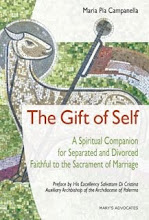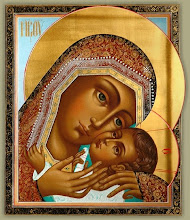I have been spending more time reading Familiaris Consortio. It has a lot of beautiful descriptions of what love, marriage, and family are. It also has a lot of insight into what the family in todays world is up against. There is a lot of information in Familiaris Consortio, and everyone who is married or considering marriage should read it. I am attaching some excerpts of things that particulary struck me as I read it. I also put a link on the side of my blog so that if you like you can read the entire thing on the vatican website. Please pray for families and marriages in this day and age, as they are under immense attack.
At the root of these negative phenomena there frequently lies a corruption of the idea and the experience of freedom, conceived not as a capacity for realizing the truth of God's plan for marriage and the family, but as an autonomous power of self-affirmation, often against others, for one's own selfish well-being.
This shows that history is not simply a fixed progression towards what is better, but rather an event of freedom, and even a struggle between freedoms that are in mutual conflict, that is, according to the well-known expression of St. Augustine, a conflict between two loves: the love of God to the point of disregarding self, and the love of self to the point of disregarding God.
In a deservedly famous page, Tertullian has well expressed the greatness of this conjugal life in Christ and its beauty: "How can I ever express the happiness of the marriage that is joined together by the Church strengthened by an offering, sealed by a blessing, announced by angels and ratified by the Father? ...How wonderful the bond between two believers with a single hope, a single desire, a single observance, a single service! They are both brethren and both fellow-servants; there is no separation between them in spirit or flesh; in fact they are truly two in one flesh and where the flesh is one, one is the spirit."
By virtue of the sacramentality of their marriage, spouses are bound to one another in the most profoundly indissoluble manner. Their belonging to each other is the real representation, by means of the sacramental sign, of the very relationship of Christ with the Church.
Spouses are therefore the permanent reminder to the Church of what happened on the Cross; they are for one another and for the children witnesses to the salvation in which the sacrament makes them sharers. Of this salvation event marriage, like every sacrament, is a memorial, actuation and prophecy: "As a memorial, the sacrament gives them the grace and duty of commemorating the great works of God and of bearing witness to them before their children. As actuation, it gives them the grace and duty of putting into practice in the present, towards each other and their children, the demands of a love which forgives and redeems. As prophecy, it gives them the grace and duty of living and bearing witness to the hope of the future encounter with Christ.
Accordingly, the family must go back to the "beginning" of God's creative act, if it is to attain self-knowledge and self-realization in accordance with the inner truth not only of what it is but also of what it does in history. And since in God's plan it has been established as an "intimate community of life and love,"(44) the family has the mission to become more and more what it is, that is to say, a community of life and love, in an effort that will find fulfillment, as will everything created and redeemed, in the Kingdom of God. Looking at it in such a way as to reach its very roots, we must say that the essence and role of the family are in the final analysis specified by love. Hence the family has the mission to guard, reveal and communicate love, and this is a living reflection of and a real sharing in God's love for humanity and the love of Christ the Lord for the Church His bride.
The family, which is founded and given life by love, is a community of persons: of husband and wife, of parents and children, of relatives. Its first task is to live with fidelity the reality of communion in a constant effort to develop an authentic community of persons.
As the Second Vatican Council writes: "Firmly established by the Lord, the unity of marriage will radiate from the equal personal dignity of husband and wife, a dignity acknowledged by mutual and total love."
Conjugal communion is characterized not only by its unity but also by its indissolubility: "As a mutual gift of two persons, this intimate union, as well as the good of children, imposes total fidelity on the spouses and argues for an unbreakable oneness between them."
Being rooted in the personal and total self-giving of the couple, and being required by the good of the children, the indissolubility of marriage finds its ultimate truth in the plan that God has manifested in His revelation: He wills and He communicates the indissolubility of marriage as a fruit, a sign and a requirement of the absolutely faithful love that God has for man and that the Lord Jesus has for the Church.
The gift of the sacrament is at the same time a vocation and commandment for the Christian spouses, that they may remain faithful to each other forever, beyond every trial and difficulty, in generous obedience to the holy will of the Lord: "What therefore God has joined together, let not man put asunder."
Various reasons can unfortunately lead to the often irreparable breakdown of valid marriages. These include mutual lack of understanding and the inability to enter into interpersonal relationships. Obviously, separation must be considered as a last resort, after all other reasonable attempts at reconciliation have proved vain.
Pastors must know that, for the sake of truth, they are obliged to exercise careful discernment of situations. There is in fact a difference between those who have sincerely tried to save their first marriage and have been unjustly abandoned, and those who through their own grave fault have destroyed a canonically valid marriage.
Sunday, April 26, 2009
Subscribe to:
Post Comments (Atom)




















No comments:
Post a Comment